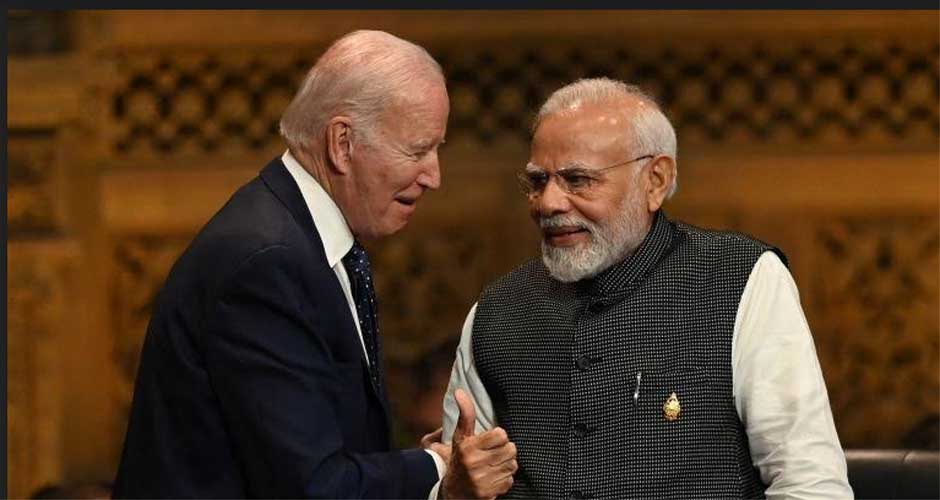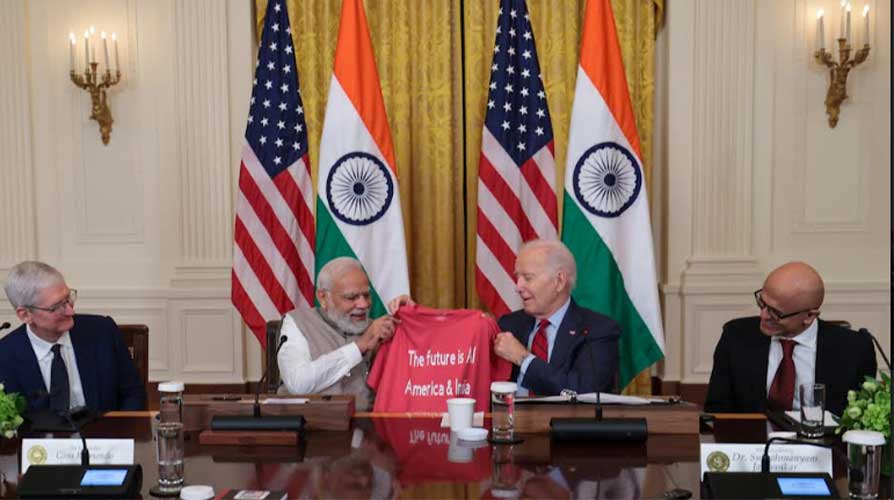By TN Ashok
Washington, June 30: The White House has, in a brief assessing the impact of Indian Prime Minister Narendra Modi’s visit to the USA in June this year , said it has opened up a new and fresh chapter in Indo US relations that binds the two countries in a new level of trust and mutual understanding to build a strong diverse partnership.
The brief , posted on the White House website, says the U.S.-India Comprehensive Global and Strategic Partnership is anchored in a new level of trust and mutual understanding that will build an even stronger, diverse U.S.-India partnership that will usher in a prosperous future grounded in respect for human rights, and shared principles of democracy, freedom, and the rule of law.

“Our cooperation will serve the global good as we work through a range of multilateral and regional groupings – particularly the Quad– to contribute toward a free, open, inclusive, and resilient Indo-Pacific. No corner of human enterprise is untouched by the partnership between our two great countries, which spans the seas to the stars”, the brief said.
Charting a Technology Partnership for the Future
US President Joe Biden and Prime Minister Narendra Modi by affirming that technology will play the defining role in deepening partnership, have hailed the Initiative on Critical and Emerging Technology (iCET) as a major milestone in U.S.-India relations. The leaders recommitted the United States and India to fostering an open, accessible, and secure technology ecosystem, based on mutual confidence and trust.
President Biden and Prime Minister Modi have embarked on new frontiers across all sectors of space cooperation. They welcomed the decision of NASA and ISRO to develop a strategic framework for human spaceflight cooperation by the end of 2023.The leaders hailed the announcement by NASA to provide advanced training to Indian astronauts at the Johnson Space Center in Houston, Texas, with a goal of mounting a joint effort to the International Space Station in 2024.
The White House hailed the MoU signed between President Biden and Prime Minister Modi on Semiconductor Supply Chain and Innovation Partnership as a significant step in the two nations joint efforts towards a semiconductor incentive program. This will promote commercial opportunities, research, talent, and skill development. The leaders welcomed an announcement by Micron Technology, Inc., to invest up to $825 million to build a new semiconductor assembly and test facility in India with support from the Indian government. The combined investment valued at $2.75 billion would create up to 5,000 new direct and 15,000 community jobs opportunities in the next five years.

President Biden and Prime Minister Modi share a vision of creating secure and trusted telecommunications, resilient supply chains, and enabling global digital inclusion. To fulfill this vision, the leaders launched two Joint Task Forces on advanced telecommunications, focused on Open RAN and research and development in 5G/6G technologies. Public-private cooperation between vendors and operators will be led by India’s Bharat 6G Alliance and the U.S. Next G Alliance, the White House brief said.
The leaders welcomed 35 innovative joint research collaborations in emerging technologies funded by the U.S. National Science Foundation (NSF) and the Indian Department of Science and Technology (DST).
Both President Biden and Prime Minister Modi acknowledged the profound opportunities and significant risks associated with AI. Accordingly, they committed to develop joint and international collaboration on trustworthy and responsible AI, including generative AI, to advance AI education and workforce initiatives, promote commercial opportunities, and mitigate against discrimination and bias.
President Biden and Prime Minister Modi hailed the deepening bilateral cooperation on cutting-edge scientific infrastructure, including a $140 million in-kind contribution from the Indian Department of Atomic Energy (DAE) to the U.S. Department of Energy’s (DOE’s) Fermi National Laboratory toward collaborative development of the Proton Improvement Plan-II Accelerator, for the Long Baseline Neutrino Facility — the first and largest international research facility on U.S. soil. Powering a Next Generation Defense Partnership.
The White House said the U.S.-India Major Defense Partnership has emerged as a pillar of global peace and security. Through joint exercises, strengthening of defense industrial cooperation, the annual “2+2” Ministerial Dialogue, and other consultative mechanisms, we have made substantial progress in building an advanced and comprehensive defense partnership in which our militaries coordinate closely across all domains.
President Biden and Prime Minister Modi hailed the landmark signing of an MoU between General Electric and Hindustan Aeronautics Limited for the manufacture of GE F-414 jet engines in India, for the Hindustan Aeronautics Limited Light Combat Aircraft Mk 2. This trailblazing initiative to manufacture F-414 engines in India will enable greater transfer of U.S. jet engine technology than ever before.
President Biden and Prime Minister Modi also welcomed India’s emergence as a hub for maintenance and repair for forward deployed U.S. Navy assets and the conclusion of Master Ship Repair Agreements with Indian shipyards. This will allow the U.S. Navy to expedite the contracting process for mid-voyage and emergent repair.
India and the United States committed to create innovative investment platforms that will effectively lower the cost of capital and attract international private finance at scale to accelerate the deployment of greenfield renewable energy, battery storage, and emerging green technology projects in India.
Deepening Strategic Convergence
As global partners, the United States and India affirm that the rules-based international order must be respected. They emphasized that the contemporary global order has been built on principles of the UN Charter, international law, and respect for sovereignty and territorial integrity of states. This was in apparent referene to China not adhering to rule based trading with either country.
President Biden and Prime Minister Modi expressed their deep concern over the conflict in Ukraine and mourned its terrible and tragic humanitarian consequences. The leaders underscored the serious and growing impacts of the war on the global economic system, including on food, fuel and energy security, and critical supply chains. They called for greater efforts to mitigate the consequences of the war, especially in the developing world.
The White House elaborated on some 54 points that would heighten Indo US relations to stabilize the geo political region besides bringing peace and security to all nations in the region as also deepenening the defense, trade and investment opportunities between the two countries and putting them on an even keel.
